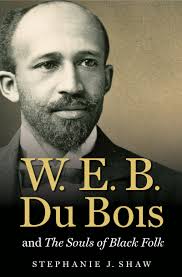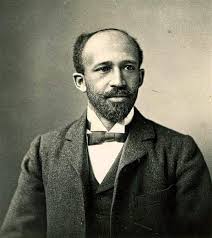The Souls of Black Folk Page #26
The Souls of Black Folk is a 1903 work of American literature by W. E. B. Du Bois. It is a seminal work in the history of sociology and a cornerstone of African-American literature. The book contains several essays on race, some of which the magazine Atlantic Monthly had previously published.
From the curtains in Benton’s house, down the road, a dark comely face is staring at the strangers; for passing carriages are not every-day occurrences here. Benton is an intelligent yellow man with a good-sized family, and manages a plantation blasted by the war and now the broken staff of the widow. He might be well-to-do, they say; but he carouses too much in Albany. And the half-desolate spirit of neglect born of the very soil seems to have settled on these acres. In times past there were cotton-gins and machinery here; but they have rotted away. The whole land seems forlorn and forsaken. Here are the remnants of the vast plantations of the Sheldons, the Pellots, and the Rensons; but the souls of them are passed. The houses lie in half ruin, or have wholly disappeared; the fences have flown, and the families are wandering in the world. Strange vicissitudes have met these whilom masters. Yonder stretch the wide acres of Bildad Reasor; he died in war-time, but the upstart overseer hastened to wed the widow. Then he went, and his neighbors too, and now only the black tenant remains; but the shadow-hand of the master’s grand-nephew or cousin or creditor stretches out of the gray distance to collect the rack-rent remorselessly, and so the land is uncared-for and poor. Only black tenants can stand such a system, and they only because they must. Ten miles we have ridden to-day and have seen no white face. A resistless feeling of depression falls slowly upon us, despite the gaudy sunshine and the green cottonfields. This, then, is the Cotton Kingdom,—the shadow of a marvellous dream. And where is the King? Perhaps this is he,—the sweating ploughman, tilling his eighty acres with two lean mules, and fighting a hard battle with debt. So we sit musing, until, as we turn a corner on the sandy road, there comes a fairer scene suddenly in view,—a neat cottage snugly ensconced by the road, and near it a little store. A tall bronzed man rises from the porch as we hail him, and comes out to our carriage. He is six feet in height, with a sober face that smiles gravely. He walks too straight to be a tenant,—yes, he owns two hundred and forty acres. “The land is run down since the boom-days of eighteen hundred and fifty,” he explains, and cotton is low. Three black tenants live on his place, and in his little store he keeps a small stock of tobacco, snuff, soap, and soda, for the neighborhood. Here is his gin-house with new machinery just installed. Three hundred bales of cotton went through it last year. Two children he has sent away to school. Yes, he says sadly, he is getting on, but cotton is down to four cents; I know how Debt sits staring at him. Wherever the King may be, the parks and palaces of the Cotton Kingdom have not wholly disappeared. We plunge even now into great groves of oak and towering pine, with an undergrowth of myrtle and shrubbery. This was the “home-house” of the Thompsons,—slave-barons who drove their coach and four in the merry past. All is silence now, and ashes, and tangled weeds. The owner put his whole fortune into the rising cotton industry of the fifties, and with the falling prices of the eighties he packed up and stole away. Yonder is another grove, with unkempt lawn, great magnolias, and grass-grown paths. The Big House stands in half-ruin, its great front door staring blankly at the street, and the back part grotesquely restored for its black tenant. A shabby, well-built Negro he is, unlucky and irresolute. He digs hard to pay rent to the white girl who owns the remnant of the place. She married a policeman, and lives in Savannah. Now and again we come to churches. Here is one now,—Shepherd’s, they call it,—a great whitewashed barn of a thing, perched on stilts of stone, and looking for all the world as though it were just resting here a moment and might be expected to waddle off down the road at almost any time. And yet it is the centre of a hundred cabin homes; and sometimes, of a Sunday, five hundred persons from far and near gather here and talk and eat and sing. There is a schoolhouse near,—a very airy, empty shed; but even this is an improvement, for usually the school is held in the church. The churches vary from log-huts to those like Shepherd’s, and the schools from nothing to this little house that sits demurely on the county line. It is a tiny plank-house, perhaps ten by twenty, and has within a double row of rough unplaned benches, resting mostly on legs, sometimes on boxes. Opposite the door is a square home-made desk. In one corner are the ruins of a stove, and in the other a dim blackboard. It is the cheerfulest schoolhouse I have seen in Dougherty, save in town. Back of the schoolhouse is a lodgehouse two stories high and not quite finished. Societies meet there,—societies “to care for the sick and bury the dead’; and these societies grow and flourish. We had come to the boundaries of Dougherty, and were about to turn west along the county-line, when all these sights were pointed out to us by a kindly old man, black, white-haired, and seventy. Forty-five years he had lived here, and now supports himself and his old wife by the help of the steer tethered yonder and the charity of his black neighbors. He shows us the farm of the Hills just across the county line in Baker,—a widow and two strapping sons, who raised ten bales (one need not add “cotton” down here) last year. There are fences and pigs and cows, and the soft-voiced, velvet-skinned young Memnon, who sauntered half-bashfully over to greet the strangers, is proud of his home. We turn now to the west along the county line. Great dismantled trunks of pines tower above the green cottonfields, cracking their naked gnarled fingers toward the border of living forest beyond. There is little beauty in this region, only a sort of crude abandon that suggests power,—a naked grandeur, as it were. The houses are bare and straight; there are no hammocks or easy-chairs, and few flowers. So when, as here at Rawdon’s, one sees a vine clinging to a little porch, and home-like windows peeping over the fences, one takes a long breath. I think I never before quite realized the place of the Fence in civilization. This is the Land of the Unfenced, where crouch on either hand scores of ugly one-room cabins, cheerless and dirty. Here lies the Negro problem in its naked dirt and penury. And here are no fences. But now and then the crisscross rails or straight palings break into view, and then we know a touch of culture is near. Of course Harrison Gohagen,—a quiet yellow man, young, smooth-faced, and diligent,—of course he is lord of some hundred acres, and we expect to see a vision of well-kept rooms and fat beds and laughing children. For has he not fine fences? And those over yonder, why should they build fences on the rack-rented land? It will only increase their rent.
Translation
Translate and read this book in other languages:
Select another language:
- - Select -
- 简体中文 (Chinese - Simplified)
- 繁體中文 (Chinese - Traditional)
- Español (Spanish)
- Esperanto (Esperanto)
- 日本語 (Japanese)
- Português (Portuguese)
- Deutsch (German)
- العربية (Arabic)
- Français (French)
- Русский (Russian)
- ಕನ್ನಡ (Kannada)
- 한국어 (Korean)
- עברית (Hebrew)
- Gaeilge (Irish)
- Українська (Ukrainian)
- اردو (Urdu)
- Magyar (Hungarian)
- मानक हिन्दी (Hindi)
- Indonesia (Indonesian)
- Italiano (Italian)
- தமிழ் (Tamil)
- Türkçe (Turkish)
- తెలుగు (Telugu)
- ภาษาไทย (Thai)
- Tiếng Việt (Vietnamese)
- Čeština (Czech)
- Polski (Polish)
- Bahasa Indonesia (Indonesian)
- Românește (Romanian)
- Nederlands (Dutch)
- Ελληνικά (Greek)
- Latinum (Latin)
- Svenska (Swedish)
- Dansk (Danish)
- Suomi (Finnish)
- فارسی (Persian)
- ייִדיש (Yiddish)
- հայերեն (Armenian)
- Norsk (Norwegian)
- English (English)
Citation
Use the citation below to add this book to your bibliography:
Style:MLAChicagoAPA
"The Souls of Black Folk Books." Literature.com. STANDS4 LLC, 2025. Web. 9 Jan. 2025. <https://www.literature.com/book/the_souls_of_black_folk_310>.




Discuss this The Souls of Black Folk book with the community:
Report Comment
We're doing our best to make sure our content is useful, accurate and safe.
If by any chance you spot an inappropriate comment while navigating through our website please use this form to let us know, and we'll take care of it shortly.
Attachment
You need to be logged in to favorite.
Log In